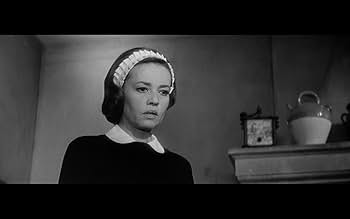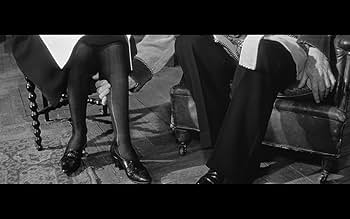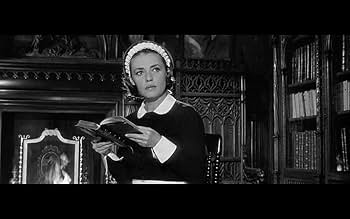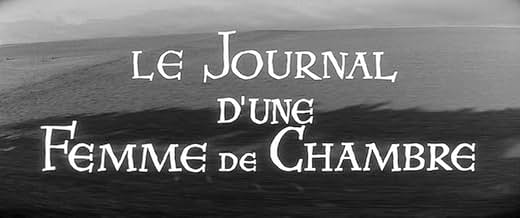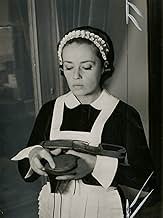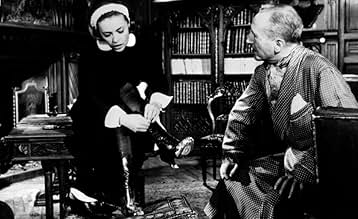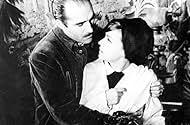IMDb-BEWERTUNG
7,4/10
10.210
IHRE BEWERTUNG
Füge eine Handlung in deiner Sprache hinzuA sophisticated and self-assured woman from Paris joins a middle-class rural estate as a maid and causes quite a stir among the variously uptight, perverse and violent inhabitants.A sophisticated and self-assured woman from Paris joins a middle-class rural estate as a maid and causes quite a stir among the variously uptight, perverse and violent inhabitants.A sophisticated and self-assured woman from Paris joins a middle-class rural estate as a maid and causes quite a stir among the variously uptight, perverse and violent inhabitants.
- Regie
- Drehbuch
- Hauptbesetzung
- Auszeichnungen
- 1 Gewinn & 2 Nominierungen insgesamt
Empfohlene Bewertungen
This is only my second Bunel film (The Discreet Charm of the Bourgeoisie), and I am fascinated with the way he portrays the upper crust. here we have an odd family with some strange habits. Didn't you always think they were like that. It's the old joke about how you can determine class bu how two couples sit in a car. Lower class - men in front and women in the back; middle class husbands and wives sit together; upper class husbands sit with the other's wife.
Show fetishes, randy husbands, cold wives, rape and murder are all here amidst a fascist France. They are always going on about the republicans, ours would fit right in with the anti-semitism and xenophobia.
Among all this is the classic acting of Jeanne Moreau, a classy chambermaid, who is even willing to marry a fascist to prove him guilty of murder and rape. In the end, she turns out to be just an opportunist.
It would probably be more enjoyable knowing more about 1930s France, but it was still a classic.
Show fetishes, randy husbands, cold wives, rape and murder are all here amidst a fascist France. They are always going on about the republicans, ours would fit right in with the anti-semitism and xenophobia.
Among all this is the classic acting of Jeanne Moreau, a classy chambermaid, who is even willing to marry a fascist to prove him guilty of murder and rape. In the end, she turns out to be just an opportunist.
It would probably be more enjoyable knowing more about 1930s France, but it was still a classic.
Bunuel's 'Diary Of A Chambermaid' was released in between two of his surreal masterpieces 'The Exterminating Angel' and 'Simon Of The Desert'. It is, on the surface at least, a lot more conventional as either of those, maybe that's why it doesn't get as much attention as it deserves. I don't know why it is rarely mentioned when people discuss the very best of Bunuel, but for me it's almost as great as 'Viridiana' and 'Belle De Jour'. The story was previously filmed by Renoir in the 1940s, but I haven't seen that version, so I can't say how different Bunuel's approach to the material is. As Bunuel claimed not to have seen it either I don't feel so bad. Jean Moreau, the beautiful star of Truffaut's 'Jules And Jim' and countless other Euro art film favourites, gives a brilliant performance as the enigmatic Celestine, maid to The Monteils, a very odd family living in pre-War France. Bunuel includes some of his usual comments about sexual deviance, and France's future under the Nazi occupation haunts the whole film, but what is most interesting to me about the picture is its subtlety and ambiguity. Like 'Belle De Jour' I think each repeated viewing will reveal more, and opinions on its meaning will depend on the individual viewer. Personally I'm still exploring Bunuel's extraordinary body of work. It is exciting doing so. I've probably only seen a third of his output so far, but I've yet to see a movie made by him that is less than fascinating. 'Diary Of A Chambermaid' just might be his most underrated film. I highly recommend it.
I will say outright that not only is Luis Bunuel my favorite film director but I also consider him one of the ten of the all-time greatest. Rarely did a renowned film-maker make such a remarkable comeback after years of exile as Bunuel did with LOS OLVIDADOS (1950) and, even rarer still, did one director have such a sustained series of masterworks released towards the twilight of his career. Having said all this, however, I think that LE JOURNAL D'UNE FEMME DA CHAMBRE aka DIARY OF A CHAMBERMAID (1964) is the weakest of the final ten feature films Bunuel made during the most fruitful period of his career (between 1961 and 1977) if such a choice were to be made, that is.
Don't get me wrong; I do think that LE JOURNAL is an excellent film and would probably be considered a bona-fide masterpiece if it were made by a lesser director. There is much to enjoy in the film: Jeanne Moreau's superb central performance as the opportunistic Celestine stricken by an unexpected sense of moral duty prompting her to nail the killer of the child even if she has to marry him to do so; Michel Piccoli's hilarious turn as the eternally insatiable but perennially unsatisfied master of the household who, when his sexual advances towards Celestine are turned down by the latter, has to make do with the ugly-looking house-maid; the aged father-in-law who invites Celestine into his room to read for him, all the while indulging in his foot fetish; the sadistic manservant who thinks nothing of violating and murdering innocent little girls while nurturing dreams of sealing his independence with the purchase of a pub all his own and with Celestine as his partner; the eccentric neighbour who sabotages their garden at every turn and yet yearns for Celestine's companionship, etc. Bunuel offers a typically scathing satire of the bourgeoisie here and, as has already been stated by others in this thread, also shows that he is adept at utilizing the widescreen format despite this being his first and only stab at it, as well as imbuing seemingly trivial and innocent sequences with a subtly perverse touch of subversion.
Even so, I do tend to generally agree with eminent film critic Leslie Halliwell's verdict on this particular film: 'Interesting but not especially successful Bunuel version; the subject is certainly up his street but the novel (by Octave Mirbeau) seems to restrict him'. I found the ending incomprehensible and disappointing myself at first but now I can appreciate not only its irony but its audacity. I have now watched the film three times twice on VHS and once on Criterion's DVD and I must say that it does improve with each viewing.
I don't know if anyone of you has seen Jean Renoir's 1946 US film version but somehow I actually prefer it to Bunuel's. I can't say I concur with Halliwell's review this time around dismissing as it did Renoir's film: 'Hollywood notables were all at sea in this wholly artificial and unpersuasive adaptation of a minor classic'! Leonard Maltin, a well-known US film critic, didn't like it much either saying that it was an 'uneasy attempt at a Continental-style romantic comedy tries hard but never really sure of what it wants to be (the cast) do their best to liven things'! Based on these two capsule reviews I was hardly expecting it to be a patch on the Bunuel version but I nevertheless purchased the PAL VHS (issued by 4 Front but subsequently deleted) since it was quite cheap and, after all, medium Renoir (another of my favorites, by the way) is better than many other film-makers around!
But, surprisingly, what could have easily been a inconsequential and frothy comedy of manners (the result of the typically sanitized Hollywood rewrites of subversive European literature) turned out to be an unprecedented black comedy with that uniquely French bleak outlook of things. Paulette Goddard plays Celestine in this one and she has probably never been better. In fact, as was also the case with the later Bunuel adaptation, the performances here are all first-rate: Hurd Hatfield as the idealistic young son who falls hopelessly in love with Celestine; Judith Anderson as the lady of the house firmly in control of every situation but with some strange alliances of her own; Irene Ryan as a timid scullery maid; Reginald Owen as the weak-willed master of the house perpetually harassed by his wife's demands; and particularly Burgess Meredith (who also wrote the screenplay!) as the half-crazed and shell-shocked retired Army Captain who is their neighbor; but especially Francis Lederer whose portrayal of the devilish manservant Joseph lusting after Celestine while scheming behind the back of his oppressive masters is quite chilling.
Doing some more reading on this film after watching it a couple of times, I found out that there are those who think more highly of Renoir's DIARY OF A CHAMBERMAID than I was previously led to believe. In fact, if I'm not mistaken, no less an authority than Andre' Bazin, in his famous unfinished critical study of Renoir's films, goes so far as to call it a masterpiece and the finest of all the films Renoir made in America between 1941 and 1947. Well, who am I to argue? I do recommend that you seek it out if you have the chance if only to see how it compares with the more readily available Bunuel version.
The thing which struck me most when comparing these two film versions is how different the plot-line actually is from one film to the other. I haven't read the book so I can't say which is the more legitimate one but the differences are quite noteworthy: while there is no child murder in the Renoir version, Joseph does get to kill the eccentric neighbor; there is no handsome young master in Bunuel's version; there is no aged patriarch in Renoir's version; Joseph does not survive to see the realization of his dreams in the Renoir version but rather gets himself slightly killed in a climactic fight in the city streets with Celestine's young pretender, etc. I think it would be a worthwhile exercise if I were to get my hands on Octave Mirbeau's original novel some day!
As a matter of fact, I think a similarly fascinating comparison could be made between (incidentally, another favorite director of mine) Josef von Sternberg's final film with Marlene Dietrich, THE DEVIL IS A WOMAN (1935) and Luis Bunuel's cinematic swan song, CET OBSCUR OBJET DU DESIR aka THAT OBSCURE OBJECT OF DESIRE (1977) both of which were adapted from the same source material: Pierre Louys' 'La Femme Et Le Pantin'.
Don't get me wrong; I do think that LE JOURNAL is an excellent film and would probably be considered a bona-fide masterpiece if it were made by a lesser director. There is much to enjoy in the film: Jeanne Moreau's superb central performance as the opportunistic Celestine stricken by an unexpected sense of moral duty prompting her to nail the killer of the child even if she has to marry him to do so; Michel Piccoli's hilarious turn as the eternally insatiable but perennially unsatisfied master of the household who, when his sexual advances towards Celestine are turned down by the latter, has to make do with the ugly-looking house-maid; the aged father-in-law who invites Celestine into his room to read for him, all the while indulging in his foot fetish; the sadistic manservant who thinks nothing of violating and murdering innocent little girls while nurturing dreams of sealing his independence with the purchase of a pub all his own and with Celestine as his partner; the eccentric neighbour who sabotages their garden at every turn and yet yearns for Celestine's companionship, etc. Bunuel offers a typically scathing satire of the bourgeoisie here and, as has already been stated by others in this thread, also shows that he is adept at utilizing the widescreen format despite this being his first and only stab at it, as well as imbuing seemingly trivial and innocent sequences with a subtly perverse touch of subversion.
Even so, I do tend to generally agree with eminent film critic Leslie Halliwell's verdict on this particular film: 'Interesting but not especially successful Bunuel version; the subject is certainly up his street but the novel (by Octave Mirbeau) seems to restrict him'. I found the ending incomprehensible and disappointing myself at first but now I can appreciate not only its irony but its audacity. I have now watched the film three times twice on VHS and once on Criterion's DVD and I must say that it does improve with each viewing.
I don't know if anyone of you has seen Jean Renoir's 1946 US film version but somehow I actually prefer it to Bunuel's. I can't say I concur with Halliwell's review this time around dismissing as it did Renoir's film: 'Hollywood notables were all at sea in this wholly artificial and unpersuasive adaptation of a minor classic'! Leonard Maltin, a well-known US film critic, didn't like it much either saying that it was an 'uneasy attempt at a Continental-style romantic comedy tries hard but never really sure of what it wants to be (the cast) do their best to liven things'! Based on these two capsule reviews I was hardly expecting it to be a patch on the Bunuel version but I nevertheless purchased the PAL VHS (issued by 4 Front but subsequently deleted) since it was quite cheap and, after all, medium Renoir (another of my favorites, by the way) is better than many other film-makers around!
But, surprisingly, what could have easily been a inconsequential and frothy comedy of manners (the result of the typically sanitized Hollywood rewrites of subversive European literature) turned out to be an unprecedented black comedy with that uniquely French bleak outlook of things. Paulette Goddard plays Celestine in this one and she has probably never been better. In fact, as was also the case with the later Bunuel adaptation, the performances here are all first-rate: Hurd Hatfield as the idealistic young son who falls hopelessly in love with Celestine; Judith Anderson as the lady of the house firmly in control of every situation but with some strange alliances of her own; Irene Ryan as a timid scullery maid; Reginald Owen as the weak-willed master of the house perpetually harassed by his wife's demands; and particularly Burgess Meredith (who also wrote the screenplay!) as the half-crazed and shell-shocked retired Army Captain who is their neighbor; but especially Francis Lederer whose portrayal of the devilish manservant Joseph lusting after Celestine while scheming behind the back of his oppressive masters is quite chilling.
Doing some more reading on this film after watching it a couple of times, I found out that there are those who think more highly of Renoir's DIARY OF A CHAMBERMAID than I was previously led to believe. In fact, if I'm not mistaken, no less an authority than Andre' Bazin, in his famous unfinished critical study of Renoir's films, goes so far as to call it a masterpiece and the finest of all the films Renoir made in America between 1941 and 1947. Well, who am I to argue? I do recommend that you seek it out if you have the chance if only to see how it compares with the more readily available Bunuel version.
The thing which struck me most when comparing these two film versions is how different the plot-line actually is from one film to the other. I haven't read the book so I can't say which is the more legitimate one but the differences are quite noteworthy: while there is no child murder in the Renoir version, Joseph does get to kill the eccentric neighbor; there is no handsome young master in Bunuel's version; there is no aged patriarch in Renoir's version; Joseph does not survive to see the realization of his dreams in the Renoir version but rather gets himself slightly killed in a climactic fight in the city streets with Celestine's young pretender, etc. I think it would be a worthwhile exercise if I were to get my hands on Octave Mirbeau's original novel some day!
As a matter of fact, I think a similarly fascinating comparison could be made between (incidentally, another favorite director of mine) Josef von Sternberg's final film with Marlene Dietrich, THE DEVIL IS A WOMAN (1935) and Luis Bunuel's cinematic swan song, CET OBSCUR OBJET DU DESIR aka THAT OBSCURE OBJECT OF DESIRE (1977) both of which were adapted from the same source material: Pierre Louys' 'La Femme Et Le Pantin'.
This is the most straight-forward film I've seen by the surrealist master Bunuel, and despite its cryptic turn in the final moments, is funny, chilling, and a bit nasty. The story follows an urbane chambermaid from Paris who comes to work at the country estate of a repressed bourgeosie family. She weathers passes from every man in sight and deflects them, but for morally ambiguous reasons. Moral ambiguity is rampant, as it is so often in Bunuel's films, and spread liberally amongst all classes. It's subtly a film about selling out, except that nobody seemed to have any principles to begin with. Good fun. Now tell me what the ending was all about.
The best thing about Bunuel is his ruthless lucidity, and it's thoroughly on display here. All his films start from the conviction that no one is to be pitied - or even if they are, Bunuel, like life, will not oblige, and neither the audience nor the person concerned should expect it of them. Which is not to say that all abuses are right - the film postulates that between fascist and violent criminal there is little difference, and then, true to lucid form, makes it clear at the end that evil does *not* automatically bring about its own destruction; a fact not to be lamented but fought over. Bunuel said he thought it was his most erotic film. It's not an unreasonable claim. There's not a single sex scene. Go figure.
Wusstest du schon
- WissenswertesThis is Luis Buñuel's only film in the anamorphic widescreen format.
- PatzerAt the train station, Célestine is supposed to be returning to Paris but she's waiting on the wrong side of the tracks: In one shot, one can clearly read "Direction Paris" on the other side.
- VerbindungenFeatured in A propósito de Buñuel (2000)
Top-Auswahl
Melde dich zum Bewerten an und greife auf die Watchlist für personalisierte Empfehlungen zu.
- How long is Diary of a Chambermaid?Powered by Alexa
Details
Box Office
- Weltweiter Bruttoertrag
- 17 $
- Laufzeit
- 1 Std. 37 Min.(97 min)
- Farbe
- Sound-Mix
- Seitenverhältnis
- 2.35 : 1
Zu dieser Seite beitragen
Bearbeitung vorschlagen oder fehlenden Inhalt hinzufügen

